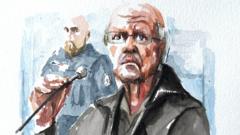Joel Le Scouarnec's case highlights systemic failures, sparking outrage among victims and advocates for reform in sentencing for sexual offenders.
**French Surgeon Sentenced to 20 Years for Horrific Patient Abuse**

**French Surgeon Sentenced to 20 Years for Horrific Patient Abuse**
A former surgeon found guilty of sexually abusing hundreds of patients, primarily children, faces a two-decade prison term.
The courtroom was heavy with emotion as Joel Le Scouarnec, a 74-year-old former surgeon known as France's most notorious paedophile, received his 20-year sentence for sexually abusing 299 patients, most of them children. The verdict was delivered by Judge Aude Burési, who emphasized the calculated nature of Le Scouarnec's crimes, targeting vulnerable individuals while they were ill or sedated.
Le Scouarnec, who wore a black outfit in court and displayed little emotion, accepted responsibility for his actions, but many victims remain disturbed by the prospect of his early parole eligibility due to time already served. Amélie Lévêque, one of the victims, expressed disgust at the possibility of Le Scouarnec possibly reclaiming a semblance of normal life. “It is upsetting to think he might someday walk down the street, while we can no longer lead a regular life,” she stated.
Lawyer Francesca Satta criticized the leniency of the sentence relative to the scope of the crimes, calling for legal reform to ensure harsher penalties for such offenders. Even Le Scouarnec's attorney, Maxime Tessier, has acknowledged the significant societal failings that allowed the surgeon to continue his medical practice, despite previous allegations and convictions.
Testimonies during the trial revealed the profound impact the abuse has had on victims, with some reporting trauma leading to suicidal thoughts. The psychological scars left by the abuse continue to haunt many, as echoed in heartbreaking accounts from family members of victims who suffered deeply as a result of Le Scouarnec's actions.
The trial has ignited discussions about the healthcare system's inaction and has spurred advocates to demand accountability not only from Le Scouarnec but also from the institutions that failed the victims. The National Order of Doctors admitted their shortcomings in monitoring Le Scouarnec’s practice, prompting discussions on reforms needed to protect future patients from similar abuses.
Despite the legal outcome, many victims and their families feel a sense of neglect from society and the justice system. A plea for awareness and preventive measures, especially for future generations, underscores the tragic legacy left behind by such a pervasive abuse of power in the medical field.
Le Scouarnec, who wore a black outfit in court and displayed little emotion, accepted responsibility for his actions, but many victims remain disturbed by the prospect of his early parole eligibility due to time already served. Amélie Lévêque, one of the victims, expressed disgust at the possibility of Le Scouarnec possibly reclaiming a semblance of normal life. “It is upsetting to think he might someday walk down the street, while we can no longer lead a regular life,” she stated.
Lawyer Francesca Satta criticized the leniency of the sentence relative to the scope of the crimes, calling for legal reform to ensure harsher penalties for such offenders. Even Le Scouarnec's attorney, Maxime Tessier, has acknowledged the significant societal failings that allowed the surgeon to continue his medical practice, despite previous allegations and convictions.
Testimonies during the trial revealed the profound impact the abuse has had on victims, with some reporting trauma leading to suicidal thoughts. The psychological scars left by the abuse continue to haunt many, as echoed in heartbreaking accounts from family members of victims who suffered deeply as a result of Le Scouarnec's actions.
The trial has ignited discussions about the healthcare system's inaction and has spurred advocates to demand accountability not only from Le Scouarnec but also from the institutions that failed the victims. The National Order of Doctors admitted their shortcomings in monitoring Le Scouarnec’s practice, prompting discussions on reforms needed to protect future patients from similar abuses.
Despite the legal outcome, many victims and their families feel a sense of neglect from society and the justice system. A plea for awareness and preventive measures, especially for future generations, underscores the tragic legacy left behind by such a pervasive abuse of power in the medical field.




















